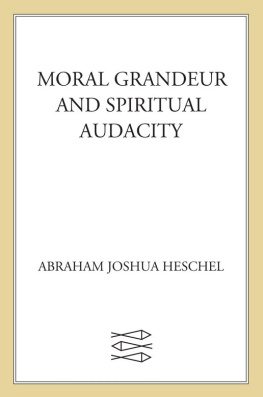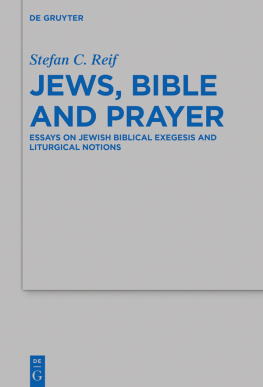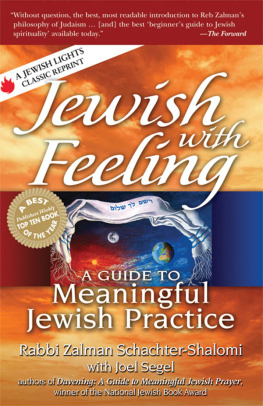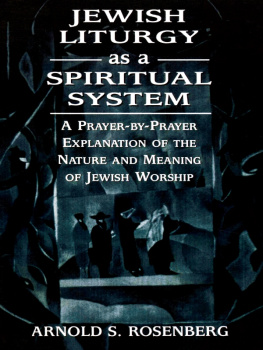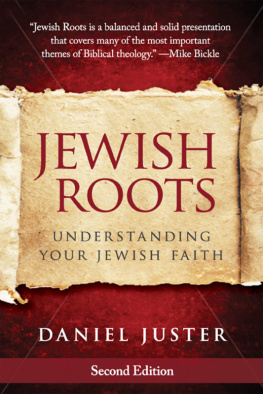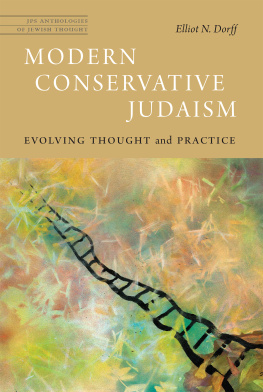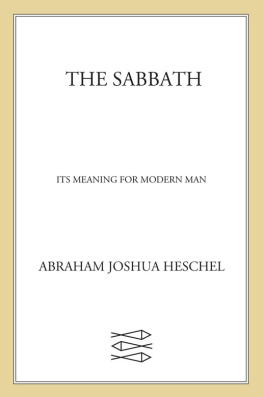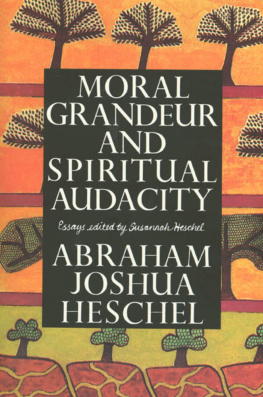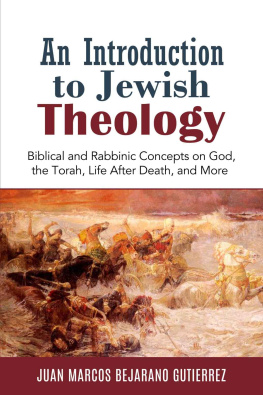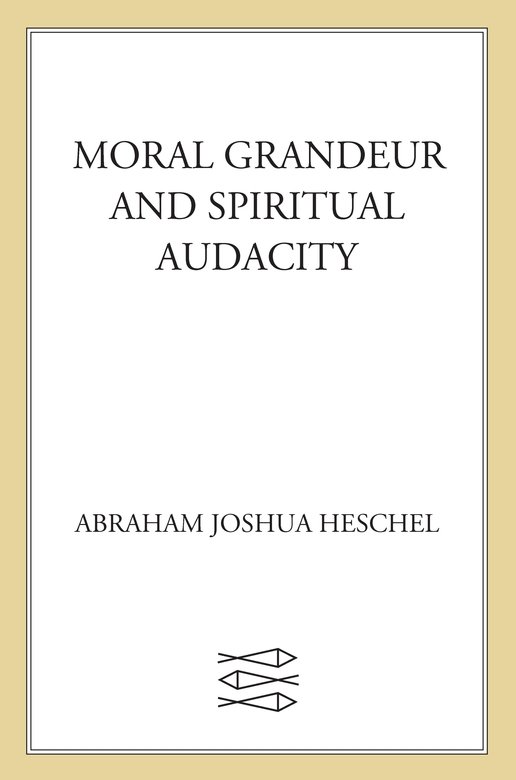The editor gratefully acknowledges permission to reprint the following:
The Moment at Sinai, American Zionist (February 5, 1953), pp. 1820. By permission of American Zionist.
We Cannot Force People to Believe, Who Is a Jew?: A Reader , ed. Solomon S. Bernards (New York: Anti-Defamation League of Bnai Brith, 1959), pp. 3839. By permission of the Anti-Defamation League of Bnai Brith.
A Time for Renewal, Midstream (May 1972), pp. 4651. By permission of Midstream.
On the Day of Hate, English translation by Leonard Wolf. By permission of Leonard Wolf.
Symbolism and Jewish Faith, Religious Symbolism, ed. F. Ernest Johnson (New York: The Institute for Religious and Social Studies, 1955), pp. 5379. By permission of the Louis Finkelstein Institute.
The Spirit of Jewish Prayer, Proceedings of the Rabbinical Assembly of America, ed. Rabbi Max Weine, vol. 17 (1953), pp. 151215. Copyright 1953 by the Rabbinical Assembly. By permission of the Rabbinical Assembly.
Toward an Understanding of the Halacha, Yearbook of the Central Conference of American Rabbis, vol. 63 (1953), pp. 386409. By permission of the Yearbook of the Central Conference of American Rabbis.
Yom Kippur, Masat Rav , Professional Supplement to Conservative Judaism (August 1965), pp. 1314. Copyright 1965 by the Rabbinical Assembly. By permission of the Rabbinical Assembly.
Anniversary of the Emancipation Proclamation, The United Synagogue Review (Winter 1964), pp. 14, 2627. By permission of the United Synagogue Review. Reprinted here as The Plight of Russian Jews.
The Mystical Element in Judaism, The Jews: Their History, Culture, and Religion, ed. Louis Finkelstein (New York: Harper & Brothers, 1949), pup 60223. By permission of HarperCollins Publishers.
God, Torah, and Israel, trans. Byron Sherwin, Theology and Church in Times of Change: Essays in Honor of John Coleman Bennett, eds. Edward LeRoy Long, Jr., and Robert Handy (Philadelphia: Westminster Press, 1970), pp. 7190. By permission of Westminster John Knox Press.
The Moral Dilemma of the Space Age, Space: Its Impact on Man and Society , ed. Lilian Levy (New York: Norton, 1964), pp. 17679. By permission of Maxwell Aley Associates Literary Agency for Lilian Levy.
Required: A Moral Ombudsman, United Synagogue Review (Fall, 1971), pp. 4, 5, 28. By permission of the United Synagogue Review.
The Reasons for My Involvement in the Peace Movement, Journal of Social Philosophy, vol. 4, no. i (January 1973), pp. 78. By permission of the Journal of Social Philosophy.
No Religion Is an Island, Union Seminary Quarterly Review (January 1966), pp. 11734. By permission of the Union Seminary Quarterly Review.
On Prayer, Conservative Judaism (Fall 1970), pp. 112. Copyright 1970 by the Rabbinical Assembly. By permission of the Rabbinical Assembly.
What Ecumenism Is, Face to Face: A Primer in Dialogue, ed. Lily Edelman (Washington, D.C.: Bnai Brith, Adult Jewish Education, 1967), pp. 14. By permission of the Commission on Jewish Education/Bnai Brith Books.
The People of the Covenant, Theologians at Work , ed. Patrick Granfield (New York: Macmillan, 1967), pp. 6985. Copyright 1967 by Patrick Granfield. By permission of Simon & Schuster Inc. Reprinted here as Interview at Notre Dame.
What We Might Do Together, Religious Education, vol. 62, no. 2 (March-April 1967), pp. 13340. By permission of Religious Education .
Reinhold Niebuhr: A Last Farewell, Conservative Judaism (Summer 1971), pp. 112. Copyright 1971 by the Rabbinical Assembly. By permission of the Rabbinical Assembly.
The Holy Dimension, The Journal of Religion (April 1943), pp. 11724. Copyright 1943 by the University of Chicago. All rights reserved. By permission of the University of Chicago.
Faith, The Reconstructionist (November 3, 1944), pp. 1216. By permission of The Reconstructionist /Reconstructionism Today.
Carl Stems Interview with Dr. Heschel. Copyright 1973 by the National Broadcasting Company, Inc. All rights reserved. By permission of the National Broadcasting Company.
Interview at Notre Dame
INTERVIEWER: What was your impression of Father Bernard Hrings talk on holiness in the Church and religious life?
RABBI HESCHEL: Worship is the primary form of religious living. He who doesnt know how to worship doesnt know how to believe and what it means to be alive. In that sense, I would say that worship precedes faith. Father Hrings entire emphasis on the life of worship and prayer is one that I consider valid and indispensable.
Was there anything in his address that you would question?
Yes, I have one basic question. In his interpretation of worship and the role of the Holy Spirit, he was exceedingly Christ-centered. This raises some serious theological problems. Is it really necessary for a Christian to believe that the Creator of heaven and earth has resigned His power to Jesus and that God Himself, Omnipotent Father, is unable to reach men directly? What of the psalmist? Would you be willing to say that the psalmist didnt know how to pray? And what of those who do not accept the claim of the Church? Are the Jews and Mohammedans unable to pray or address themselves to God? Father Hring, by saying that the act of worship is an act in Christ, indicated that there is only one acceptable form of prayer. As a Jew, I must reject that, and I also consider it dangerous to Christians.
Dont you think that Father Hring would agree that one can pray directly to God? He would probably point to the Divine Office, the official prayer of the Church, which draws heavily from the Old Testament.
It is true that the Hebrew Biblea term that should replace the condescending term Old Testamentstresses the relationship of immediacy between man and God. But I feel that within the new thinking that is taking place in the Church, there is need of a further clarificationon this question. I know that the Church stresses the centrality of Jesus in the process of salvation. I do not think, however, it has had to stress the centrality of Jesus in the process of inspiration and worship.
Is the question salvation through the synagogue important in contemporary Judaism?
No. Thats not our problem. One of the greatest sources of mutual understanding is that Christians and Jews have different problems. In Christianity, the problem of salvation is paramount. In Judaism, other issues are central. I can best illustrate this by a little story. One of my ancestors was Rabbi Levi Itzhak, a Hasidic rabbi, one of the great saints in Jewish history. He once said: I know very well that I am unworthy of eternal life, because I am a sinner and have always failed to do the will of God. What will happen to me when I come before the heavenly court? The decree will certainly be that I enter hell, and that will be the will of God. What greater joy is there than to do the will of God? I will utter a benediction and run to hell in order to suffer, because such is the will of God. We believe in an afterlife. We believe that every one of us individually will be called upon to give account of the life we lived. We are not saved by the synagogue; our destiny will be determined by what we do or fail to do. The commandment, the mitzvah , to serve God, is a term more central than the term salvation. Shall I give you another example?

